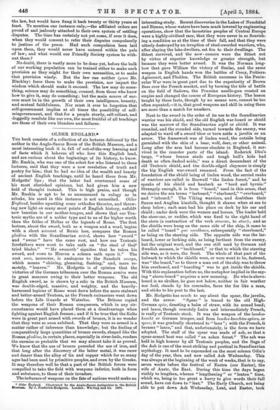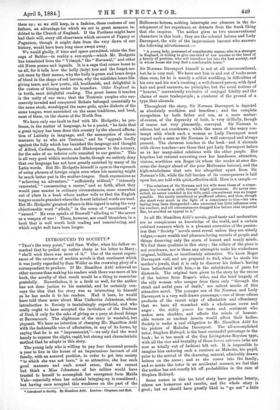OLDER ENGLAND.*
THE book consists of a collection of six lectures delivered by the author in the Anglo-Saxon Room of the British Museum, and a -most interesting book it is, fall of out-of-the-way learning and 'of facts which it behoves all who . love this English land, and are curious about the beginnings of its history, to know. Mr. Raskin, who was one of the select few who listened to these lectures, said that they were a new revelation of truth and poetry for him; that he had no idea of the wealth and beauty of ancient English teachings, until he heard them from Mr. Hodgetts' lips ; that the latter had overturned some of his most cherished opinions, but had given him a new field of thought instead. This is high praise, and though Mr. Ruskin is apt to be as unmeasured in eulogy as in rebuke, his meed in this instance is not unmerited. Older England, besides upsetting some orthodox theories, and throw- ing new light on many moot points of English history, unfolds new beauties in our mother-tongue, and shows that our Teu- tonic myths are of a nobler type and to us of far higher worth than the fables of Hellas or the legends of Rome. The first lecture, about the sword, both as a weapon and a word, begins with a short account of Runic lore, compares the Roman gladius with the Scandinavian svdrd, shows how " sword " and " swear " have the same root, and how our Teutonic forefathers were wont to take oath on "the steel of their tried blades." "'He sweareth ' signifies that he takes his sword, and vows to Heaven a solemn oath upon it." The root aver, moreover, is analogous to the Sanskrit sverga, which means "shining, gleaming, flashing," and, more re- motely, "heaven." Mr. Hodgetts is of opinion that the victories of the German tribesmen over the Roman armies were in great measure owing to their better weapons. The old English sword, as is shown by a relic in the British Museum, was double-edged, massive, and weighty, and the heavily- harnessed legions of Rome went down before the more stalwart and better-armed Teutons, as the French cuirassiers went down before the Life Guards at Waterloo. The Britons copied the weapons of their Roman conquerors, which in any cir- cumstances would have placed them at a disadvantage when fighting against English foemen ; and if it be true that the Kelts were in great part armed with swords of bronze, it is no wonder that they were so soon subdued. That they were so armed is a matter rather of inference than knowledge; but the finding of comparatively large quantities of bronze swords, shaped like the Roman gladius,in certain places, especially in river-beds, renders the surmise so probable that we may almost take it as proved. We know that the use of bronze preceded the use of iron, and that long after the discovery of the latter metal, it was rarer and dearer than the alloy of tin and copper which for so many ages had been used by primitive peoples, and even by the Greeks. it may therefore well be that a part of the British forces were compelled to take the field with weapons inferior, both in form and substance, to those of their invaders.
The influence of weapons on the fate of nations would make an
* Older ',island. Illustrated by the Anglo-Saxon Antiquities in the British Kamm. Si J. Frederick Hodgetts. London Whildng and Co. Dm.
interesting study. Recent discoveries in the Lakes of Neuchitel and Bienne, whose waters have been much lowered by engineering operations, show that the lacnstrine peoples of Central Europe were a highly-civilised race, that they were never in so flourish- ing a condition as at the time of their fall, and that they were utterly destroyed by an irruption of steel-sworded warriors, who, after slaying the lake-dwellers, set fire to their dwellings. The fittest survived, and the new- comers were the fittest not by virtue of superior knowledge or greater strength, but because they were better armed. It was the Norman long- bow that gave William the victory of Senlac, and the same weapon in English hands won the battles of Crecy, Poitiers, Agincourt, and Flodden. The British successes in the Penin- sular War were in'great part duo to the superiority of Brown Bess over the French musket, and by turning the tide of battle on the field of Sa,dowa, the Prussian needle-gun created an empire and changed the course of European history. The lesson taught by these facts, though by no means new, cannot be too often repeated,—it is, that good weapons and skill in using them are more than a match for numbers.
Next to the sword in the order of its use to the Scandinavian warrior was his shield, and the old English war-board or shield was the marrow of the Scandinavian scyld or slciold. It was rounded, and the rounded side, turned towards the enemy, was adapted to ward off a sword blow or turn aside a javelin or an arrow. The framework was of linden wood, the outside being garnished with the skin of a bear, wolf, deer, or other animal. Long after the arm had become obsolete in England, it sur- vived in the remoter parts of the island. Roderick Dha's targe, "whose brazen studs and tough bull's hide had death so often dashed aside," was a direct descendant of the old Teutonic shield, and the double-edged claymore is simply the big English war-sword renamed. From the fact of the foundation of the shield being of linden wood, the serried ranks of warriors are called in Beowulf "the linden forest," and he speaks of his shield and hauberk as " bord and byrnie." Strangely enough, it is from "board," used in this sense, that we derive the sea terms "larboard," "starboard," "overboard," and "inboard." The Viking warriors, and doubtless their Saxon and Anglian kinsfolk, thought it shame when at sea to sleep below ; each man had his place on deck by his oar and shield ; under deck were the women and horses. The leader held the steer-oar, or rudder, which was fixed to the right hand of the stern (a contraction of the verb steoran, to steer); and as the shields were hung on the same side of the ship, it came to be called " board " par excellence, subsequently " steerboard," as being on the steering side. The opposite side was the lar- board, lower or lurking side, as being furthest from the enemy, but the original word, and the one still used by German and Swedish seamen, is "backboard," or that to which the steering side was, as it were, the front. The whole of that part of the bulwark to which the shields were, or were wont to be, fastened, was " the board," so to throw a man out of the ship was to throw him overboard, and " boarding " was to get inside the shields. With this explanation before us, the metaphor implied in the say- ing " above-board " acquires a new meaning. He who is above- board is no skulker, he goes not below, neither in fair weather nor foal, stands by his comrades, faces the foe like a man, and sticks to his post to the last.
Mr. Hodgetts has much to say about the spear, the javelin, and the arrow. " Spear " is traced to the old High. German spar, denoting a halm of straw, with its armed head; and lance, though remotely Latin and intermediately French, is really of Teutonic stock. It was the weapon of the landes- knecht or German trooper, and from landes-knechtes-spiers, or speer, it was gradually shortened to " lans "; with the French, it became "lance," and that, unfortunately, is the form we have adopted. The staff of the spear was made of ash, so that a spear-armed host was called "an ashen forest." The ash was held in high honour by all Teutonic peoples, and the Saga of the Ash is one of the most striking and poetical in Scandinavian
mythology. It used to be expounded on the most solemn Odin's day of the year, then and now called Ash Wednesday. This was always at the beginning of the week of weeks, that is to say, seven weeks before the festival of Eostra (our Easter), the wife of Anstr, the East. During this time the days began
visibly to lengthen, whence " lengthening " or " lenten " time, which we, being in too great a hurry to give words their full sound, have cat down to "lent." The Early Church, not being able to put down Ash Wednesday, Lent, and Easter, took them up ; so we still keep, in a fashion, these customs of our fathers, an advantage for which we are in great measure in- debted to the Church of England. If the Puritans might have had their will, every old observance which savours of Papacy or Paganism, though it might date from the very dawn of our history, would have been long since swept away.
We would gladly, if time and space permitted, relate the fine saga of Baldur—in reality a sun-myth—which Mr. Hodgetts has translated from the " Volaspa," the " Havamil," and other old Norse poems and legends. It is a, saga that comes home to as all, for it tells how the holly (holy) tree and the forget-me- not came by their names, why the holly is green and bears drops of blood in the shape of red berries, why the mistletoe bears life- giving tears, and how poetic, old, heathenish, and delightful is the custom of kissing under its branches. Older England is, in truth, most delightful reading. The great lesson it teaches is the unity of our race; that the Teutonic peoples who sac- cessvely invaded and conquered Britain belonged essentially to the same stock, worshipped the same gods, spoke dialects of the same tongue, were nourished on the same traditions, and bred, most of them, on the shores of the North Sea.
We have only one fault to find with Mr. Hodgetts; he pro- fesses, in the matter of language, to be a purist, "he feels that a great injury has been done this country by the absurd affecta- tion of Latinity in language, and the assumption of classic manners by us who are Teutons," and. he "appeals loudly against the folly which has banished the language and thought of Alfred, Credmon, Spenser, and Shakespeare to the nursery, for the sake of an inferior cults unsuited to our genius." This is all very good within moderate limits, though we entirely deny that our language has not been greatly enriched by many of its Latin words. But Mr. Hodgetts himself is open to the reproach of using phrases of foreign origin even when his meaning might be much better put in the mother-tongue. Such expressions as "achieving an adventure," "sufficiently utilised," "intensely venerated," "commencing a career," and so forth, albeit they would pass muster in ordinary circumstances, seem somewhat out of place in a book whose author tells 119 that the English tongue sounds grandest wherethe fewest latinised words are used. But Mr. Hodgetts' greatest offence in this regard is using the very
objectionable word "allude," in the sense of " mentioned " or "named." He even speaks of Beowulf " alluding to" the arrow as a weapon of war ! These, however, are small blemishes, in a book that is well worth both reading and remembering, and which might well have been longer.















































 Previous page
Previous page